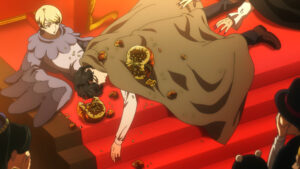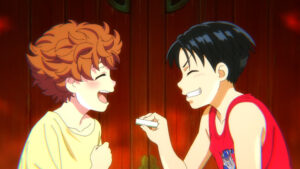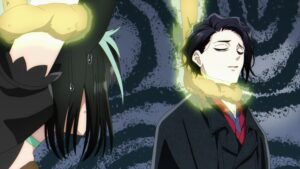Animated horror can be a pretty hard genre to nail. You know what you’re watching, so you’re expecting to be scared, and it being animated removes it from the real world, narrowing your options. Comedy can be similarly difficult. Due to how subjective it be, its common to fall back on slapstick, what with animations malleable bodies and stylized violence. But what if I were to tell you there was an anime that does both? A situational comedy that gets laughs not from banana peels or pies to the face, but absurd surreal situations? That successfully transitions to a full blown horror, complete with a murder mystery? Well that show is what I’m here to talk about today. Animated studio GEEKTOYS, directed by Mankyuu and originally created by the late Nami Sano who passed earlier this year, I give to you my favorite anime of Fall 2023: Migi & Dali.
Be warned, this review contains minor unmarked spoilers for Migi & Dali. It also contains major spoilers in some sections however these will be heavily marked to avoid accidents.
Narrative
Let’s start with Migi & Dali’s most defining feature, its narrative. The core of Migi & Dali’s story is one of revenge, as a pair of twins named, you guessed it, Migi and Dali return to Origon Village to discover who murdered their mother. Along the way they will find friends and allies, discover all manner of secrets in this quaint little town, and perhaps even find a family of their own. To do this, they work to become adopted by a local family. However there’s a wrinkle: That family is only looking for one child, not two. But what about two who are one? One individual across two bodies, acting in concert, swapping in and out to accomplish tasks as needed. While one works the other investigates, always watching, always learning about this little town.
Now I can hear you asking, didn’t I call Migi & Dali a horror comedy? This sounds like pure mystery horror! Well as I said, Migi & Dali’s brand of comedy is very surreal. Early on the series uses its premise to justify weird situations or to create off-putting scenes. Take an example from early on in episode two as an example. The twins overhear a their foster parents discussing a secret and become convinced they want to kill them. So the only thing to do? Kill them first, with a plan so silly and naïve only children who don’t really understand killing could be. Played straight, this is attempted murder. But Migi & Dali never plays it straight, so instead it comes off as this surreal humor. This sort of subversion of expectations is the shows bread and butter, from episode one all the way to the end.
What makes Migi & Dali truly special though is how it manages to catch you by surprise eight, nine, ten episodes later. The further in you get the more serious the situations and the less naïve our leads become. Slowly but surely it transforms into the mystery horror it originally billed itself as, but the shift is so slow and subtle you don’t notice it until you actually get spooked. It’s as if the series starts at 80% humor and 20% horror before, by the end, flipping those percent’s entirely. Or perhaps it’s more accurate to say that it successfully merged the two together, never losing either. However you want to describe it, the point is that Migi & Dali successfully balances both surrealist humor, horror, and light-hearted family moments into a downright heartwarming story about two twins finding closure for their mother and a new home in Origon Village.
The only major criticism I have about Migi & Dali’s story is that sometimes it gets weird. Like… Teenagers in diapers acting like babies weird. While these moments are relevant to the story, I can’t help but feel they are unnecessary and that what Migi & Dali was going for could have been communicated in a different, more effective way. I don’t think these scenes will ruin the show for anyone, they are over rather quickly and there aren’t many of them. But they do exist, and they will probably weird some people out. I know they did me, which is saying something because Migi & Dali’s regular weirdness was exactly what I was looking for. It’s just these few scenes where it goes to far, without adding much to the actual story in return.
Overall though I’d say Migi & Dali has one of the best stories of the year. Its balance of humor and horror, of weird and heart-warming, is almost perfect. In fact by the end I was full on crying. Even now, as I’m writing this review, thinking back to that ending still brings tears to my eyes. Oh did I not mention that? Yeah, Migi & Dali actually ends. There’s no cliffhanger, no “Season Two” that never comes, no “Go read the manga”. Migi & Dali begins and ends in this cour, never overstaying its welcome, and it’s better for it. So if a 13 episode self contained series that goes from surrealist comedy to fully fledged horror to heart-warming found family sounds like something you’re looking for, than stop reading this review and go watch it. Or well… Finish reading and then go watch it, need that engagement.
Characters
Moving on we come to the characters. After how much I wrote about the narrative, it should come as no surprise that the characters are great as well. For the most part at least. All of the main cast are pretty solid. This covers Migi and Dali, obviously, Eiji Ichijo and his mother Reiko, Migi’s friend Akiyama, and the Sonoyama’s. While not all of them have “arcs” per se, really only Migi and Dali get that much focus and we will get to them, they all get enough attention to shine and show us who they really are. Whether it be Akiyama going from this weird bird kid to a true friend or the Sonoyama’s from airheads to legitimately some of the best parents in anime. I guarantee you’ll cry for at least one of them. I did for multiple of them!
The only characters I would say fall short are some of the side-cast. The maid, Mit-chan, for instance. She exists as this loosely supportive adult, the first one the twins feel they can truly trust. Yet she never becomes anymore more than the well-intentioned gossiping neighborhood cleaning lady, which is disappointing considering her role in the story. Maruta, another local child, gets a similar treatment. He starts as a twat and ends… As a slightly lesser twat. Hell it might even be more accurate to say he ends simply as our twat, in that he doesn’t really improve he just becomes loveable for it. Migi & Dali tries to do something with him, same with the remaining members of the Ichijo family like Karen, but I can’t say it succeeds. Luckily these are all relatively minor characters and don’t negatively impact the show all that much.
Finally we come to Migi and Dali, who are fantastic. They spend the series slowly evolving from “One person in two bodies” into individual people with their own personalities, interests and desires. We get to watch them discover who they are as they drift further and further apart as they see more of the outside world. This of course leads to some great confrontations between the two as, for the longest time, they were the only other person they had. To them, this separation was something to be feared, not praised. Yet throughout the shows run Migi & Dali handles it perfectly, giving them just enough space to grow and fight but always bringing it back around to the central mystery. So to make a long story short: Migi & Dali has a great core cast, and even better leads. It’s only a few supporting characters who fall short.
Production
With that we come to Migi & Dali’s production. This is, without question, the shows weakest aspect. You see, Migi & Dali doesn’t really move much. Or at all, if I’m being honest. It’s barely animated at all, using primarily still frames, slow movement and wide shots to get everyone within a single frame. There are no big sakuga moments, no subtle character acting or facial expressions, it doesn’t even have detailed or memorable backgrounds. This isn’t terribly surprising looking at GEEKTOYS other works, neither Liar Liar nor Dead Mount Death Play were visual powerhouses either. Where Migi & Dali differs from those however is that the team seems aware of this from the beginning, not even try anything particularly ambitious to begin with. So while it doesn’t look great, it never falls apart or gets in over its head either. It’s consistent the whole way through.
This is good, because while Migi & Dali’s animation isn’t all that strong, the direction does it’s best to make up for it. Again, there’s nothing to complex or fancy here, no wild SHAFT editing or fish-eye lens effects, none of that stuff. Instead Migi & Dali takes a bunch of otherwise basic shots and hones them to perfection. It knows when to hold and let something sink in, when to cut or quickly pan to keep up with a scenes energy, how to time events with the music for maximum effect. Think of it like this. Migi & Dali is a mom and pop show burger. It’s nothing new or unique, no fancy ingredients or sauces. It’s just a burger. But the patty is cooked to perfection, the lettuce is fresh, and the buns baked that morning. It’s an average dish, executed as well as it can be.
Because of this, Migi & Dali is able to nail the tone of most scenes. When it wants you to feel creeped out it turns up the music, darkens the shadows, brings in the camera and starts sliding between shots as if you were looking around frantically. When you’re meant to feel happy or touched the colors get warmer and the camera pulls out, brightening up the scene and getting rid of shadows to make you feel safe. Want to be sad? Lets up the blue balance in a scene, same with red for anger. This is what I mean by executing what little it has to perfection. And it’s why I think, despite its otherwise lackluster animation, that Migi & Dali comes out looking rather decent even as it’s the worst thing about the show.
OST
Finally we come to the OST! This is the composer, Hiroko Sebu’s, first TV length project, and only her third project overall. Her other works are a short animation called “What Happens Before War?” and a small movie by the name of “I Want to Eat Your Pancreas“. Outside of anime however she’s worked on a number of movies and TV shows, so she is by no means new to this game. So it should come as no surprise that her work on Migi & Dali’s OST was pretty damn good. For what you can expect, the OST is primarily classical in style. Hell one track titled “Moonlight” is literally Claude Debussy’s “Clair De Lune”. There are some exceptions to this, like the bumping EDM of “Detective Boys Beavers“, or “Heaven and Hell” which brings in an organ. For the most part though, it’s classical instruments.
This isn’t to say Migi & Dali doesn’t have variety though. Even when restricted to just the classics, tracks like foreboding and purposeful “Proud Woman Reiko Ichijo” manage to sound completely different from the whimsical and exploratory “My First Base, French Style” (Yes it’s what you think) or the burst of joy at the taste of something new that is “Instant hit! Cherry Pie“. An that’s not even diving into Migi & Dali’s use of leitmotifs. That song you’ve been listening to as you read this, assuming you clicked the video above? That’s the absolutely iconic “A Boy ‘Migi and Dali’“, used throughout the series whenever the twins are acting in concert. Now try “Mother’s Memory” and hear how similar they are, as that same motif is born from another melody. Or try “First Friend” as it takes it’s first tentative steps towards change. It’s all throughout the OST!
Suffice to say, I enjoyed Migi & Dali’s OST quite a bit. And while it may be difficult at times while watching the show itself to pick out the different tracks, I think it ends up being used rather well to boot. Some may not enjoy that it’s almost entirely classical music, and that’s fine. There’s no guitar, no rock, no real vocals either, and that’s going to turn some people off. But for those who either don’t mind or enjoy the genre? I think there’s a lot to love here. At the very least I think it fits the show perfectly, with the evolution of the leitmotif as the show runs being absolutely fantastic. I feel like you can chart Migi and Dali’s journey with that alone, and I think that’s pretty cool.
Closure & Coming Out of the Closet
With that we come to the personal portion of the review. This is where I drop any semblance of structure and sort of just ramble about my experience with Migi & Dali. This is no-holds-barred spoiler territory, I will be talking about the ending and what it meant to me. So if you haven’t watched the show and don’t want to be spoiled, and I highly recommend you don’t spoil yourself for this, than skip this section. I’ve already told you why I think this is a great show, just go watch it and come back. But if you have watched the show and you want to chat about it? Than read on!
So I’ve already mentioned that one of my favorite things about Migi & Dali is that it ends. That we get closure. And that’s true! But part of that is also how it ends. You see, Migi & Dali initially presents itself as a whodunit mystery. It makes you think that’s the goal, that figuring out what happened to their mother is the endgame. But we figure that out maybe… halfway through? 2/3rds? To me, the beauty of Migi & Dali is that this supposed “mystery” is really more of a vehicle for a story about family. About finding people who love you, figuring out who you are, and being comfortable that way in public. Even the inevitable “revenge” for their mother comes in the form of saving their surprise third brother, Eiji, rather than murdering the culprit as they originally intended when the series first began.
In particular, for me Migi & Dali was almost a coming out story. Throughout the series we see Migi comfortable with the Sonoyama’s, enjoy his time with them, enjoy just being a family out in the open. He finds it easy to be “himself”. Meanwhile Dali is reticent, often found literally hiding in a closet, afraid to show himself. Afraid that he won’t be accepted for who he truly is, for Dali rather than “Hitori”. It all feels like a really blatant metaphor for Dali being LGBT, which is only furthered by the whole crossdressing and kissing Eiji bit, as well as and the Sonoyama’s mention of him being “sensitive”. This is what makes their acceptance of him, all the little things they cared to notice like his favorite foods, hit so hard. The Sonoyama’s figured it out on their own, and chose to love him before he ever knew.
Maybe I’m reaching here, making connections where there aren’t any. But even if the details or what the author intended are different, the point is that Migi & Dali is an exceptionally emotional story for me. The murder mystery plays second fiddle to simply wanting these kids to be happy. And the emotional catharsis I got when it finally happened, when they sat down for that Christmas dinner, when we got that timeskip and saw them all grown up with their individual lives and hobbies, and when Dali left for college separating from Migi for the first time in years… I’ll admit it, I cried like a damn baby! And if an anime is capable of achieving that, of getting me that emotionally invested? Well than it’s worth a watch ain’t it?
Conclusion
So yeah, all in all Migi & Dali was fantastic. It’s not all that great visually, and it can get uncomfortably weird in the middle at times. But neither of those is enough to ruin an otherwise beautiful and emotional story about a pair of twins finding a home where they thought they never would. Nami Sano’s last work before her tragic passing in August of 2023 was a beautiful one. It hurts that we will never get another work from her like this, or to a lesser extent like Sakamoto Desu Ga?. Still, what we got was great, and I highly recommend you give it a watch. At only 13 episodes long, short enough that you can knock it out in a night if you really want, it is without question my favorite anime of Fall 2023.
The post Migi & Dali Review – 86/100 appeared first on Star Crossed Anime.



